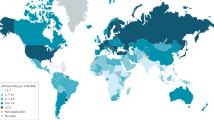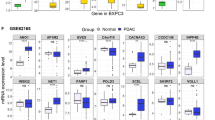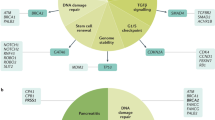Abstract
Germline mutations in CDKN2A have been reported in pancreatic cancer families, but genetic counseling for pancreatic cancer risk has been limited by lack of information on CDKN2A mutation carriers outside of selected pancreatic or melanoma kindreds. Lymphocyte DNA from consecutive, unselected white non-Hispanic patients with pancreatic adenocarcinoma was used to sequence CDKN2A. Frequencies of mutations that alter the coding of p16INK4 or p14ARF were quantified overall and in subgroups. Penetrance and likelihood of carrying mutations by family history were estimated. Among 1537 cases, 9 (0.6%) carried germline mutations in CDKN2A, including three previously unreported mutations. CDKN2A mutation carriers were more likely to have a family history of pancreatic cancer (P=0.003) or melanoma (P=0.03), and a personal history of melanoma (P=0.01). Among cases who reported having a first-degree relative with pancreatic cancer or melanoma, the carrier proportions were 3.3 and 5.3%, respectively. Penetrance for mutation carriers by age 80 was calculated to be 58% for pancreatic cancer (95% confidence interval (CI) 8–86%), and 39% for melanoma (95% CI 0–80). Among cases who ever smoked cigarettes, the risk for pancreatic cancer was higher for carriers compared with non-carriers (HR 25.8, P=2.1 × 10−13), but among nonsmokers, this comparison did not reach statistical significance. Germline mutations in CDKN2A among unselected pancreatic cancer patients are uncommon, although notably penetrant, especially among smokers. Carriers of germline mutations of CDKN2A should be counseled to avoid tobacco use to decrease risk of pancreatic cancer in addition to taking measures to decrease melanoma risk.
Similar content being viewed by others
Log in or create a free account to read this content
Gain free access to this article, as well as selected content from this journal and more on nature.com
or
References
Lynch HT, Krush AJ : Heredity and malignant melanoma: implications for early cancer detection. Can Med Assoc J 1968; 99: 17–21.
Goldstein AM, Fraser MC, Struewing JP et al: Increased risk of pancreatic cancer in melanoma-prone kindreds with p16INK4 mutations. New Engl J Med 1995; 333: 970–974.
Bartsch DK, Sina-Frey M, Lang S et al: CDKN2A germline mutations in familial pancreatic cancer. Ann Surg 2002; 236: 730–737.
Lynch HT, Brand RE, Hogg D et al: Phenotypic variation in eight extended CDKN2A germline mutation familial atypical multiple mole melanoma-pancreatic carcinoma-prone families: the familial atypical mole melanoma-pancreatic carcinoma syndrome. Cancer 2002; 94: 84–96.
Schutte M, Hruban RH, Geradts J et al: Abrogation of the Rb/p16 tumor-suppressive pathway in virtually all pancreatic carcinomas. Cancer Res 1997; 57: 3126–3130.
Jing F, Zhang J, Tao J et al: Hypermethylation of tumor suppressor genes BRCA1, p16 and 14–3–3sigma in serum of sporadic breast cancer patients. Onkologie 2007; 30: 14–19.
Debniak T, Gorski B, Huzarski T et al: A common variant of CDKN2A (p16) predisposes to breast cancer. J Med Genet 2005; 42: 763–765.
de Snoo FA, Bishop DT, Bergman W et al: Increased risk of cancer other than melanoma in CDKN2A founder mutation (p16-Leiden)-positive melanoma families. Clin Cancer Res 2008; 14: 7151–7157.
Bahuau M, Vidaud D, Jenkins RB et al: Germ-line deletion involving the INK4 locus in familial proneness to melanoma and nervous system tumors. Cancer Res 1998; 58: 2298–2303.
Yarbrough WG, Aprelikova O, Pei H, Olshan AF, Liu ET : Familial tumor syndrome associated with a germline nonfunctional p16INK4a allele. J Natl Cancer Inst 1996; 88: 1489–1491.
Lukas J, Parry D, Aagaard L et al: Retinoblastoma-protein-dependent cell-cycle inhibition by the tumour suppressor p16. Nature 1995; 375: 503–506.
Debniak Ta, van de Wetering Ta, Scott Re et al: Low prevalence of CDKN2A/ARF mutations among early-onset cancers of breast, pancreas and malignant melanoma in Poland. Eur J Cancer Prev 2008; 17: 389–391.
Ghiorzo P, Pastorino L, Bonelli L et al: INK4/ARF germline alterations in pancreatic cancer patients. Ann Oncol 2004; 15: 70–78.
Vasen HFA, Gruis NA, Frants RR, van der Velden PA, Hille ETM, Bergman W : Risk of developing pancreatic cancer in families with familial atypical multiple mole melanoma associated with a specific 19 deletion of p16 (p16-Leiden). Int J Cancer 2000; 87: 809–811.
McWilliams RR, Bamlet WR, de Andrade M, Rider DN, Cunningham JM, Petersen GM : Nucleotide excision repair pathway polymorphisms and pancreatic cancer risk: evidence for role of MMS19L. Cancer Epidemiol Biomarkers Prev 2009; 18: 1295–1302.
Nickerson DA, Tobe VO, Taylor SL : PolyPhred: automating the detection and genotyping of single nucleotide substitutions using fluorescence-based resequencing. Nucleic Acids Res 1997; 25: 2745–2751.
Agresti A : Categorical Data Analysis, 2nd edn, John Wiley & Sons: Hoboken, NJ, 2002.
Chatterjee N, Wacholder S : A marginal likelihood approach for estimating penetrance from kin-cohort designs. Biometrics 2001; 57: 245–252.
Hashemi J, Platz A, Ueno T, Stierner U, Ringborg U, Hansson J : CDKN2A germ-line mutations in individuals with multiple cutaneous melanomas. Cancer Res 2000; 60: 6864–6867.
Goldstein AM, Stacey SN, Olafsson JH et al: CDKN2A mutations and melanoma risk in the Icelandic population. J Med Gen 2008; 45: 284–289.
Spica T, Portela M, Gerard B et al: The A148T variant of the CDKN2A gene is not associated with melanoma risk in the French and Italian populations. J Invest Dermatol 2006; 126: 1657–1660.
Hussussian CJ, Struewing JP, Goldstein AM et al: Germline p16 mutations in familial melanoma. Nat Genet 1994; 8: 15–21.
Kamb A, Shattuck-Eidens D, Eeles R et al: Analysis of the p16 gene (CDKN2) as a candidate for the chromosome 9p melanoma susceptibility locus. Nat Genet 1994; 8: 23–26.
Pjanova D, Engele L, Randerson-Moor JA et al: CDKN2A and CDK4 variants in Latvian melanoma patients: analysis of a clinic-based population. Melanoma Res 2007; 17: 185–191.
Goldstein AM, Chan M, Harland M et al: High-risk melanoma susceptibility genes and pancreatic cancer, neural system tumors, and uveal melanoma across GenoMEL. Cancer Res 2006; 66: 9818–9828.
Begg CB, Orlow I, Hummer AJ et al: Lifetime risk of melanoma in CDKN2A mutation carriers in a population-based sample. J Natl Cancer Inst 2005; 97: 1507–1515.
Ghiorzo P, Gargiulo S, Nasti S et al: Predicting the risk of pancreatic cancer: on CDKN2A mutations in the melanoma-pancreatic cancer syndrome in Italy. J Clin Oncol 2007; 25: 5336–5337.
Orlow I, Roy P, Barz A, Canchola R, Song Y, Berwick M : Validation of denaturing high performance liquid chromatography as a rapid detection method for the identification of human INK4A gene mutations. J Mol Diagn 2001; 3: 158–163.
Goldstein AM : Familial melanoma, pancreatic cancer and germline CDKN2A mutations. Hum Mutat 2004; 23: 630.
Rutter JL, Goldstein AM, Davila MR, Tucker MA, Struewing JP : CDKN2A point mutations D153spl(c.457G>T) and IVS2+1G>T result in aberrant splice products affecting both p16INK4a and p14ARF. Oncogene 2003; 22: 4444–4448.
Liu L, Dilworth D, Gao L et al: Mutation of the CDKN2A 5′ UTR creates an aberrant initiation codon and predisposes to melanoma. Nat Genet 1999; 21: 128–132.
Debniak T, Scott RJ, Huzarski T et al: CDKN2A common variants and their association with melanoma risk: a population-based study. Cancer Res 2005; 65: 835–839.
Lynch HT, Brand RE, Hogg D et al: Phenotypic variation in eight extended CDKN2A germline mutation familial atypical multiple mole melanoma-pancreatic carcinoma-prone families: the familial atypical mole melanoma-pancreatic carcinoma syndrome. Cancer 2002; 94: 84–96.
Borg A, Sandberg T, Nilsson K et al: High frequency of multiple melanomas and breast and pancreas carcinomas in CDKN2A mutation-positive melanoma families. J Natl Cancer Inst 2000; 92: 1260–1266.
Goldstein AM, Struewing JP, Fraser MC, Smith MW, Tucker MA : Prospective risk of cancer in CDKN2A germline mutation carriers. J Med Genet 2004; 41: 421–424.
Leachman SA, Carucci J, Kohlmann W et al: Selection criteria for genetic assessment of patients with familial melanoma. J Am Acad of Dermatol 2009; 61: 677.e1–677.e14.
Hansen CB, Wadge LM, Lowstuter K, Boucher K, Leachman SA : Clinical germline genetic testing for melanoma. Lancet Oncol 2004; 5: 314–319.
Mantelli M, Barile M, Ciotti P et al: High prevalence of the G101W germline mutation in the CDKN2A (P16/ink4a) gene in 62 Italian malignant melanoma families. Am J Med Genet 2002; 107: 214–221.
Silverman DT, Dunn JA, Hoover RN et al: Cigarette smoking and pancreas cancer: a case-control study based on direct interviews. J Natl Cancer Inst 1994; 86: 1510–1516.
Fuchs CS, Colditz GA, Stampfer MJ et al: A prospective study of cigarette smoking and the risk of pancreatic cancer. Arch Intern Med 1996; 156: 2255–2260.
Acknowledgements
We thank the patients and families who participated in the Mayo Clinic Biospecimen Resource for Pancreas Research, and Traci Hammer, Jodie Cogswell, Cindy Wong, Patrick Burch, MD, Bridget Eversman, William Bamlet, Que Luu, Dennis Robinson, Martha Matsumoto, and KT Vu for their contributions to this study. This work was funded by NCI grants SPORE P50CA102701, K07116303 and R01CA97075.
Author information
Authors and Affiliations
Corresponding author
Ethics declarations
Competing interests
The authors declare no conflict of interest.
Rights and permissions
About this article
Cite this article
McWilliams, R., Wieben, E., Rabe, K. et al. Prevalence of CDKN2A mutations in pancreatic cancer patients: implications for genetic counseling. Eur J Hum Genet 19, 472–478 (2011). https://doi.org/10.1038/ejhg.2010.198
Received:
Revised:
Accepted:
Published:
Issue date:
DOI: https://doi.org/10.1038/ejhg.2010.198
Keywords
This article is cited by
-
Genetic and other risk factors for pancreatic ductal adenocarcinoma (PDAC)
Familial Cancer (2024)
-
Significant detection of new germline pathogenic variants in Australian Pancreatic Cancer Screening Program participants
Hereditary Cancer in Clinical Practice (2021)
-
PARP inhibitors: shifting the paradigm in the treatment of pancreatic cancer
Medical Oncology (2021)
-
Models of pancreatic ductal adenocarcinoma
Cancer and Metastasis Reviews (2021)
-
A systematic review of the prevalence of germline pathogenic variants in patients with pancreatic cancer
Journal of Gastroenterology (2021)



